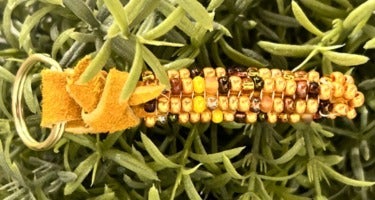Written by Sascha (she/her), student
Have you ever tried cedar tea? I had my first cup when attending a Learning Circle in the Faculty of Health’s Indigenous Gathering Space (BMH 3701), hosted by Elder Myeengun Henry.
He showed me the drink can be served both hot and cold and that a splash of maple syrup can be added for extra sweetness. It’s absolutely delicious!
As a Public Health student, I'm interested in learning about health care from a variety of perspectives. That's why, when I first came to the University of Waterloo, I was eager to learn more about the Indigenous community — especially their traditional health care and healing practices.
In 2022, a Commitment Ceremony was held which saw current President and vice-chancellor, Vivek Goel, committed to reconciliation, Indigenization, and decolonization within the University. This marked a significant step toward Truth and Reconciliation.
While there are many Indigenous spaces at Waterloo, students in the Faculty of Health have additional opportunities to learn about Indigenous cultures and knowledge.
Indigenous learning circles
Elder Myeengun Henry’s Learning Circles were held once a month and centred around the sharing of traditional knowledge, wisdom, and history of various Indigenous topics.
One series focused on the teachings of the thirteen-grandmother moons. In each session, Elder Henry discussed a different moon, explaining the story behind it and the importance of the moon in relation to the new month we are entering.
Other topics included the history of Wampum belts, traditional healing and medicine practices, and notable court cases involving Indigenous peoples in Canada. Learning Circles are open to everyone, staff and students alike. They follow a drop-in format, so you don’t need to attend every session. You can just come to the ones you have time for; no prior registration necessary.

Workshops
In addition to Learning Circles, there are a variety of events that take place in the Faculty of Health Indigenous Gathering Space that we can attend.
During a recent beading workshop, we learned how to create keychains designed to look like corn using traditional beading methods and animal hide. It took me a while to get the hang of things, but eventually, I was able to craft an adorable corn keychain that I have since shown off to all of my friends.
In another workshop, we were invited to learn about tobacco bundles. Tobacco is one of the four Sacred Medicines in Indigenous culture. Bundles of the substance are typically given as gifts, laid on the earth, or thrown into a fire during ceremonies. During the workshop, we were taught how to tie small bundles of tobacco to be used for future events.


Indigeneity within our courses
The Indigenous Gathering Space is not the only place within the Faculty of Health to learn more about Indigenous culture. Indigenous history and experiences have also been incorporated into some Health courses.
As a special topics course taught by Rhona Hanning and Elder Henry, HLTH 373 — Truth, Reconciliation & Health — is unlike any other course within the Faculty. Since it's offered as a special topic, it may not be available every term. Luckily, I had the opportunity to take it, so I can tell you about my experience. It covers painful topics like the Sixties Scoop and Residential Schools while also looking at the role of Indigenous peoples within the healthcare system. This course recognizes that, in order to understand Indigeneity relating to healthcare, we must first understand the history of Indigenous peoples in Canada and the factors that have contributed to where they are today. The course also takes a timeline approach, looking at the history of Indigenous Peoples in Canada and their relation with settlers, contemporary lifeways, and the future of Indigenization as we work towards truth and reconciliation.

What makes this course particularly unique is the unorthodox nature of the lectures. Rather than simply writing notes as we follow along with a PowerPoint presentation, we are encouraged to actively engage with our learning, participating in lively discussions and forming sharing circles in which everyone can reflect on what they’ve learned.
This course really allows us to address our knowledge of Indigenous peoples, or lack thereof, and confront any internal biases we may not have realized we had.
The learning circle is an amazing form of teaching because it makes me reflect on my own biases and transforms people from numbers into real individuals with unique stories and experiences.
The University of Waterloo is a vibrant, diverse, and welcoming place dedicated to improving the experiences of all its students. Whether it is the Faculty of Health or another campus organization, ensuring all students feel supported is always the focus.
Hopefully, this article has shown you a few more ways you can engage in the University of Waterloo's diverse community. Now go try some cedar tea!
Related articles

Health and wellness supports at Waterloo you should know about
Your mental health and your physical health are incredibly important, and your overall well-being should be made a priority. Whether you need physical care or mental health support, Waterloo offers resources that are easily accessible for those that need them.

73 questions with Faculty of Health students
Get the tea on each of our four programs – from real current students. Things like: is co-op worth it? What are the profs really like? Is the environment competitive or friendly? All the answers to your questions about the faculty of health in one place.

Indigenous spaces on campus
Waterloo has a vibrant and supportive community for you to connect with other Indigenous students, celebrate your cultures, and explore Indigenous spaces all over campus.

